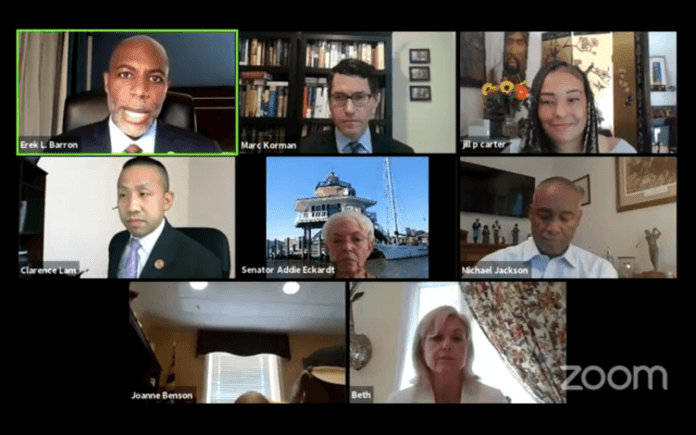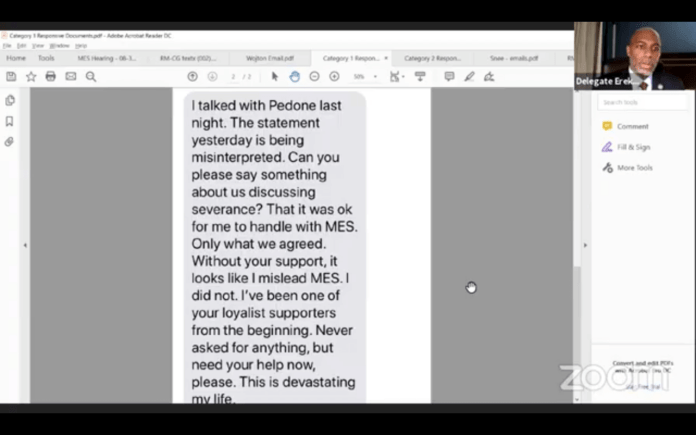This article was republished with permission from WTOP’s news partners at Maryland Matters. Sign up for Maryland Matters’ free email subscription today.

This content was republished with permission from WTOP’s news partners at Maryland Matters. Sign up for Maryland Matters’ free email subscription today.
Roy McGrath, until recently Gov. Lawrence J. Hogan Jr.’s top aide, was portrayed by his former deputy at the Maryland Environmental Service on Wednesday as an image-obsessed and secretive boss who torpedoed employee morale and undermined the women on his staff.
Beth Wojton, who held numerous top posts during her 32-year career at MES, was McGrath’s second-in-command during his three-and-a-half-year stint as its CEO. She was passed over for the top spot when he became Hogan’s chief of staff in favor of someone McGrath recommended.
She testified for more than 90 minutes on Wednesday before an online meeting of the legislature’s Joint Committee on Fair Practices and State Personnel Oversight. The session focused on MES policy, McGrath’s leadership style and the controversial payout he wrested from the agency on his way out the door.
The panel is probing MES’ decision to funnel nearly $300,000 in severance and expense reimbursement when he returned to state government as Hogan’s chief of staff in May, amid a severe economic downturn.
The MES is a 50-year-old quasi-governmental agency that works mostly with local governments on environmental works projects and programs. The agency board’s decision to approve McGrath’s severance and reimbursement requests has generated significant criticism and prompted legislative calls for reform of MES policy.
As he pressed MES board members to approve his severance request, McGrath insisted that Hogan (R) “anticipated” a lofty payout, a claim Hogan has repeatedly denied.
Wojton painted an unflattering portrait of her former boss:
- Unlike other executive directors, McGrath showed little interest in working with MES clients or getting to know the agency’s employees.
- She described him as a “secretive” leader who frequently worked off-site. “Most times, many of us on senior staff did not know his whereabouts,” she said.
- Women employees “were judged more harshly,” Wojton testified. “Staff — if they were to make a mistake — he would never, ever forget about that. And sometimes would write them off and not have any interaction with them, and that was hard to see.”
- McGrath was “very focused on image,” she said, and changed his title from executive director to CEO to give the state-created entity the feel of a private enterprise.
- When MES’ director of communications resigned, two outside PR firms were brought in to replace them, she said.
- Employee morale was poor during his tenure. “People were always tense around Mr. McGrath,” she said. “He did not relate well to the employees. There were rumors he would walk around the outside of the building so that he wouldn’t have to interact with the employees and come up the back stairs. … It felt like he didn’t respect our employees, and that was hard to take.”
Wojton charged that McGrath wanted “involvement” in MES even after becoming Hogan’s top aide. “MES has never had that much involvement from the governor’s office,” she told the panel. “I didn’t like that. It’s supposed to be an independent state agency.”
During her tenure at MES, Wojton served as director of administration, director of business development and chief of staff, and most of the organization’s department heads reported to her.
Nevertheless, she was passed over when McGrath departed in May.
“Sometimes, I feel like I was used,” she testified. “I feel like I ran the agency.”
By law, McGrath got to appoint nearly half the MES board, and he saw to it that an ally, Charles Glass, was brought in to take his place, she said. Glass took over on June 22.
Wojton said any chance she might have had to become the first female executive director in MES history were undone when she became acting director in May and started to undo some of McGrath’s policies. “Mr. McGrath would know that if I was in that position, we would definitely clash, unfortunately.”
She described herself as an expense hawk. As a result, she testified, she and other employees were routinely prevented from seeing expenses related to the Environmental Business Leadership Conference, a series of MES events held each year.
Instead, those expenses were routed to operations director Matthew Sherring, with whom McGrath had worked in other posts. Sherring’s position was created for him by McGrath when he arrived and has been vacant since Sherring left, she said. He has declined invitations to testify before the General Assembly.
Wojton said her unwillingness to sign off on McGrath’s expense and tuition reimbursement requests became additional sources of friction.
Wednesday’s hearing was the second session the committee has held to delve into McGrath’s severance.
Last week MES board members testified that they granted the severance only because they were assured Hogan was aware of the request and they didn’t want to make him — or his new top aide — angry.
Hogan has said he was generally aware that McGrath had financial matters to resolve as he left MES but he did not “approve” or have details about the $233,000 severance or the $55,000 in reimbursements.
In a text to Hogan last Wednesday, nine days after he resigned as chief of staff, McGrath told the governor his public statement was “being misinterpreted.”

“Can you please say something about us discussing severance? That it was okay for me to handle with MES,” McGrath implored. “Only what we agreed. Without your support, it looks like I mislead MES. I did not.”
McGrath then described himself as “one of your loyalist supporters from the beginning. Never asked for anything, but need your help now, please. This is devastating my life.”
Hogan told reporters on Tuesday he consulted with his chief legal counsel about the text but did not reply to it.
McGrath was invited to testify before the committee but declined. Lawmakers are considering subpoenas.
He has hired a veteran defense attorney, Bruce Marcus, and his associate Sydney Patterson, of the Greenbelt firm Marcus Bonsib LLC, to represent him, Maryland Matters has learned.
Lawmakers said they remained concerned about why MES would approve a severance to a director who was offered a lucrative job elsewhere.
“It appears to be somebody looting the store on their way out,” said Del. Erek L. Barron (D-Prince George’s), one of the committee’s two co-chairmen, in an interview after the hearing. “Mr. McGrath’s definition of a severance doesn’t seem to comport with anybody else’s.”
McGrath’s push for a six-figure payout came in the days after Hogan warned that the sharp downturn in the economy was going to force devastating budget cuts.
“In the middle of everything we’re going through, I’m sure constituents feel it’s a slap in the face,” Barron said.







